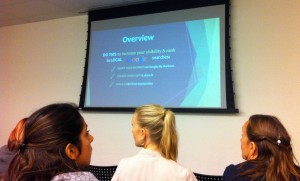Search engine optimization (SEO) is a fancy way of describing how to get you or your business in front of search engines like Google. The ideal is that someone searches for your name, of course, but SEO helps if the searcher doesn’t know you or have your name in mind.
“Get into the head” of your prospective customers and think about what words they’re looking for — known as “keywords” — said Ray Litvak in a recent talk to IABC/Toronto’s Professional Independent Communicators or PIC. (My summary of Twitter comments about the talk gives a taste of the session, but more details follow.)
Keywords describe your products or services and location, and help search engines find you online. For example, I might hope someone is searching for a “writer in Oakville.” Google determines where you rank in search results by looking at the keywords on your site to gauge your:
- Relevance (do you have what the searcher is looking for?)
- Proximity (are you near the searcher?)
- Authority (how trusted is your business?)
Ray advised taking control of your ranking by focusing on four key factors:
1. Business signals
These verify who you are and what you’re doing. Sign into your Google account and follow the steps to register your business with a free listing with Google My Business. Your business may already be there, and if so, just claim it. Otherwise, fill out the form and request verification. You’ll receive a verification code by mail. Fill out a keyword-rich description of what makes you different and what you want to be found for. Google loves niches so be specific about your specialty.
2. Link signals
- Inbound links anchor text to links elsewhere within your site. Use specific keywords (“Oakville writer”) rather than “click here.”
- Outbound links come to your site from elsewhere, such as a directory, forum or your guest post on a good site. Google again looks for authority as well as how many quality links you have.
3. On-page signals
- Your name, address and phone number, which should be consistent across any site where you have a presence
- Keywords (in the structure of your site: title tags, description tags, headlines, etc.)
- Keywords in the beginning of headlines and higher up on the page
- Domain authority (how long you’ve had the site, its relevance, the quality and amount of links)
4. Citation signals (when you’re mentioned somewhere)
- Presence of your name, address and phone number in multiple places
- Keywords in titles
- Domain authority (age, incoming links, relevance)
Ultimately, “you need to build trust with Google and become an authority,” Ray told the group. That means:
- Creating great content for the people you’re trying to reach
- Being active on social media (including Google+, which Ray loves)
- Sharing content
- Participating in chats and forums.
Do these well, Ray promised, and you’ll have success.
(A version of this post first appeared in PIC’s newsletter, The Buzz, which I edit.)
Related reading:
Feed the [SEO] beast to land on page one
How accessible websites are good for SEO

